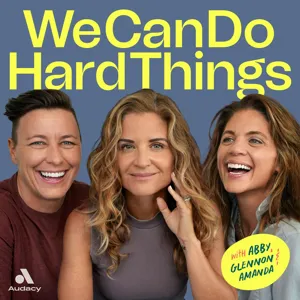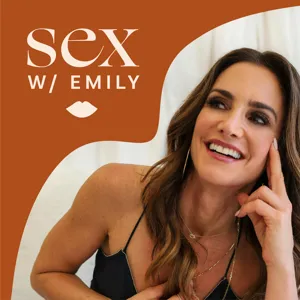Podcast Summary
Understanding common struggles: Recognize that you're not alone in your struggles, societal expectations perpetuate many issues, and seeking help and healing is your responsibility.
Many people, especially women, feel they have unique problems, but in reality, we all face similar struggles. These issues are often perpetuated by societal expectations and can lead to feelings of shame and self-blame. However, it's important to remember that these problems are not personal and are often a result of a broken world. For example, when it comes to finding the right bra size and style, 3rd love has addressed the issue of exclusivity and uncertainty with their half cup sizes, virtual fitting room, and educational resources. Similarly, when it comes to sexuality, many women feel broken or dysfunctional, but the real issue lies in the world around them. Books like "Come As You Are" provide valuable information and validation, reminding us that we are normal and our struggles are not personal failures. Our intention here is to empower and encourage listeners to recognize that they are not alone in their struggles and that it's not their fault, but it is their responsibility to seek help and healing.
Understanding the impact of societal messages on sexual confidence: Recognize societal pressures and incorrect information can negatively impact sexual confidence. Every body is unique and healthy, and understanding the dual control model of sexual response can help address reasons for sexual inhibition.
Our cultural beliefs and societal pressures can significantly impact our ability to have confident, joyful sex lives. According to sex expert Emily Nagoski, we've been taught incorrect information about our bodies, leading us to believe that some bodies are better or worse than others. This belief often stems from exposure to manipulated images of genitals in pornography and media, which can create unrealistic expectations and even lead to unnecessary surgeries. It's essential to understand that every body is unique and made of the same parts, and as long as they're not causing pain, they are healthy and beautiful precisely as they are. Another concept Emily discusses is the dual control model of sexual response, which involves both an accelerator and brakes in our brains. This model explains why we might be turned on by some things but not others, and it's crucial to recognize and address the reasons why our brakes might be engaged. By understanding these concepts and challenging the societal messages that can hinder our sexual confidence, we can work towards having more joyful and fulfilling sex lives.
Understanding Brain's Accelerators and Brakes for Sexual Health: Recognizing the complexity of brain's accelerators and brakes can lead to managing triggers, promoting healthy sexuality, and enhancing overall well-being. Different ways desire functions include spontaneous and responsive.
Our brains have complex systems for processing stimuli, which can be thought of as accelerators and brakes. These systems vary greatly from person to person, and certain experiences, emotions, or thoughts can activate either the accelerator or the brake. Common triggers for the brake include stress, anxiety, depression, body image issues, and trauma history. Understanding these patterns and learning to manage them can involve therapy, mindfulness practices, and self-reflection. Additionally, desire can manifest as either spontaneous or responsive, with spontaneous desire emerging before pleasure and responsive desire arising in response to pleasure. Understanding these different ways desire functions can lead to a more nuanced and fulfilling sexual experience. Overall, recognizing the complexity of our brains and emotions is crucial for promoting healthy sexuality and well-being.
Cultivating sexual desire and connection: Setting aside time and creating a comfortable environment can enhance sexual desire and connection in long-term relationships. Confidence in sexuality stems from knowledge and joy, and it's essential to focus on removing obstacles rather than adding enhancements.
Sexual desire and connection can be intentionally cultivated through setting aside time and creating a comfortable, enjoyable environment. This approach, known as responsive desire, is common in long-term relationships and is a healthy and normal way to experience sexual attraction. It's important to unlearn societal misconceptions about sexuality and embrace the truth about our bodies and desires. Confidence in sexuality stems from both knowledge and joy – knowing what is true and loving what is true. Comparing ourselves to unrealistic standards and judging ourselves negatively can hinder our sex lives, so it's essential to focus on removing the obstacles rather than adding more stimulation. While lingerie, sex toys, and other enhancements can be enjoyable, they may not address the root causes of sexual struggles. Ultimately, confidence in sexuality comes from understanding the truth about our bodies, sexuality, culture, and relationships.
Embrace the truth of your body: True joy in sexuality comes from loving and accepting our bodies, despite societal ideals, and embracing responsive desire.
True self-acceptance and joy in sexuality come from acknowledging and loving what is true about our bodies, even if it's not what we've been taught or what we wish were true. This means abandoning the hope of being a certain ideal and grieving the lies we've been told. It's about embracing responsive desire and the beauty of our unique bodies, no matter their size or shape. This journey towards self-love and acceptance can be challenging, but it's worth it. It's okay to take your time and give yourself a long runway to get there. Remember, the best way to shut things down is not by beating yourself up, but by being kind and patient with yourself.
Understanding the impact of conditioning on our relationship with our bodies: Recognizing and challenging negative messages about bodies can lead to improved well-being and sexual health.
The way we're conditioned to view our bodies, especially women and their sexuality, can have a profound impact on our relationship with ourselves and our genitals. This conditioning often starts at a young age, with messages of disgust and shame instilled in us, sometimes unintentionally. These messages can lead to a disconnect from our bodies, making it difficult for us to access and accept ourselves fully. It's important to recognize these messages and challenge them, starting with recognizing that they exist and understanding their origins. By learning to view our bodies in a positive and accepting way, we can improve our overall well-being and sexual health. This can involve simple acts like allowing children to explore their bodies without shame or teaching them to use the correct names for body parts. Additionally, seeking out resources like sex education and therapy can help us reframe our relationship with our bodies and overcome the negative conditioning we've internalized.
Trust your body's wisdom: Societal beliefs and scientific inaccuracies can harm us, trust your body's experiences for a holistic understanding of yourself
Our relationship with our bodies and their experiences is a source of wisdom that should not be overlooked. The speaker emphasizes the importance of looking inward for answers, even when it goes against societal or scientific norms. They share examples of how societal beliefs and scientific inaccuracies have labeled people and caused harm. The speaker encourages trusting one's own body and experience, and they advocate for more diverse voices in sex research to improve understanding and accuracy. They remind us that science, though valuable, is not infallible and has been wrong in the past. Ultimately, the speaker encourages a holistic approach to understanding ourselves and our bodies, valuing both internal and external sources of knowledge.
Beliefs about female orgasms may not reflect all women's experiences: Not all women require vaginal intercourse to achieve orgasm, as some may find pleasure and climax through clitoral stimulation or other forms of sexual activity
The research on female sexual pleasure and orgasms, which has primarily focused on cisgender college students and used language that assumes a heteronormative perspective, has led to the common belief that vaginal intercourse is necessary for women to achieve orgasm. However, this may not be the case for all women, as some may experience pleasure and orgasm through clitoral stimulation or other forms of sexual activity. The anatomy of the female genitalia, including the structure of the clitoris and the presence of the urethral sponge, may contribute to these experiences. It's important to remember that everyone's experiences and preferences are unique, and there is no "right" or "wrong" way to experience pleasure or orgasm. Additionally, the patriarchy may have an interest in perpetuating the belief that vaginal intercourse is the ultimate source of pleasure for women, as it reinforces the idea that penises are necessary for sexual satisfaction.
Finding the right therapist for healing from trauma: Embrace healing through therapy, find a therapist who understands and makes you feel comfortable, remember everyone needs help, and support each other during the healing process
Therapy can be a vital tool for healing from trauma and embracing a confident, joyful sex life. Finding the right therapist who understands your needs and makes you feel comfortable and heard is crucial. Alma, an organization that helps connect people with therapists, believes in the importance of this connection and offers a large directory of therapists who accept insurance. When dealing with trauma, therapy provides a safe space to explore deep-rooted issues and learn how to cope. It's essential to remember that everyone needs help, and no one is doing their sexuality wrong. When listening to someone's story of trauma, always respond with empathy and support. If therapy isn't an option due to financial constraints, relying on trusted friends and family can also provide valuable support during the healing process. Remember, uncomfortable feelings are not dangerous, but rather opportunities for growth.
Processing uncomfortable emotions for pleasure: Acknowledge and honor personal boundaries, expand sexual vocabulary, understand science, communicate, and foster a safe dialogue for healthier sexual experiences.
Processing and tolerating uncomfortable emotions, such as grief, rage, and trauma, during intimate experiences is a crucial skill for healing and reclaiming one's birthright to pleasure. This process can be likened to going through darkness to reach the light at the end. Survivors of chronic degradation and violence may find it challenging to separate their sexual pleasure from the trauma associated with it, making it essential to acknowledge and honor personal boundaries. Strategies for women in heteronormative marriages experiencing pain and anger during sex include expanding their sexual vocabulary and understanding the science behind sexual experiences through the dual control model. Additionally, embracing the radical moral claim of bodily self-sovereignty can serve as a foundation for creating healthier and more consensual sexual experiences. Communication and education are key to changing outcomes and involving partners in the healing process. By fostering a safe and open dialogue, both parties can work together to challenge myths, establish boundaries, and create a sexual relationship built on mutual respect and consent.
Women's Desires and Needs for Pleasure and Life's Delights: Women deserve support and communal help to balance life's demands and access their inherent right to pleasure and fulfilling lives. Demand your roses by setting boundaries, seeking support, and advocating for your needs.
Women's desires and needs for pleasure and life's delights have been undervalued and overlooked throughout history. This is evident in Freud's famous question of what a woman wants, which overlooked the importance of women's agency and self-sovereignty. However, the "Bread and Roses" movement during the early 20th century highlighted that women wanted more than just basic needs met; they wanted liberty over their own lives and access to life's pleasures. To achieve this, women need support and communal help to balance the demands of life and access their desires. By recognizing and addressing this imbalance, we can help women access their inherent right to pleasure and live fulfilling lives. This week, everyone can start demanding their roses by setting boundaries, seeking support, and advocating for their own needs and desires.
Recognize and embrace pleasure in everyday experiences: Slow down to notice sparks of pleasure in life, focus on them, and acknowledge worth to achieve greater joy and pleasure
Recognizing and embracing the pleasure and joy that exists in everyday experiences is a crucial step towards achieving erotic ecstasy. This can be achieved by noticing the sparks of pleasure in various aspects of life, such as food, friends, touch, and even our children. As Tish Melton and Brandi Carlile's music suggests, we have the ability to experience joy and pleasure if we slow down enough to notice it. By focusing on these sparks and acknowledging our worth, we can continue to believe in ourselves and overcome challenges. Remember, we're all adventurers and heart, capable of doing hard things. So, take some time to reflect on what brings you spark and makes you feel alive, and let that be your guide towards experiencing greater pleasure and joy in your life.






